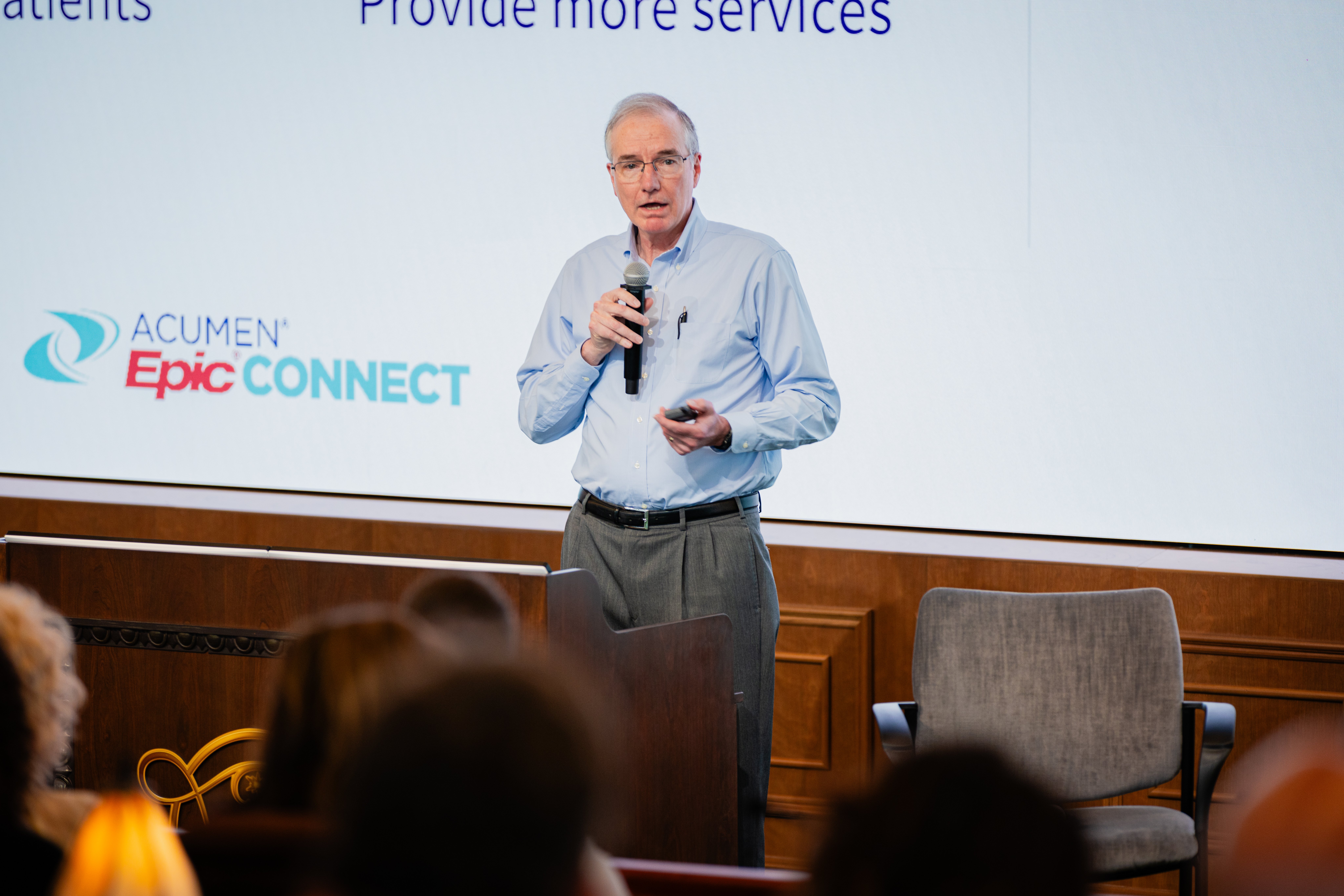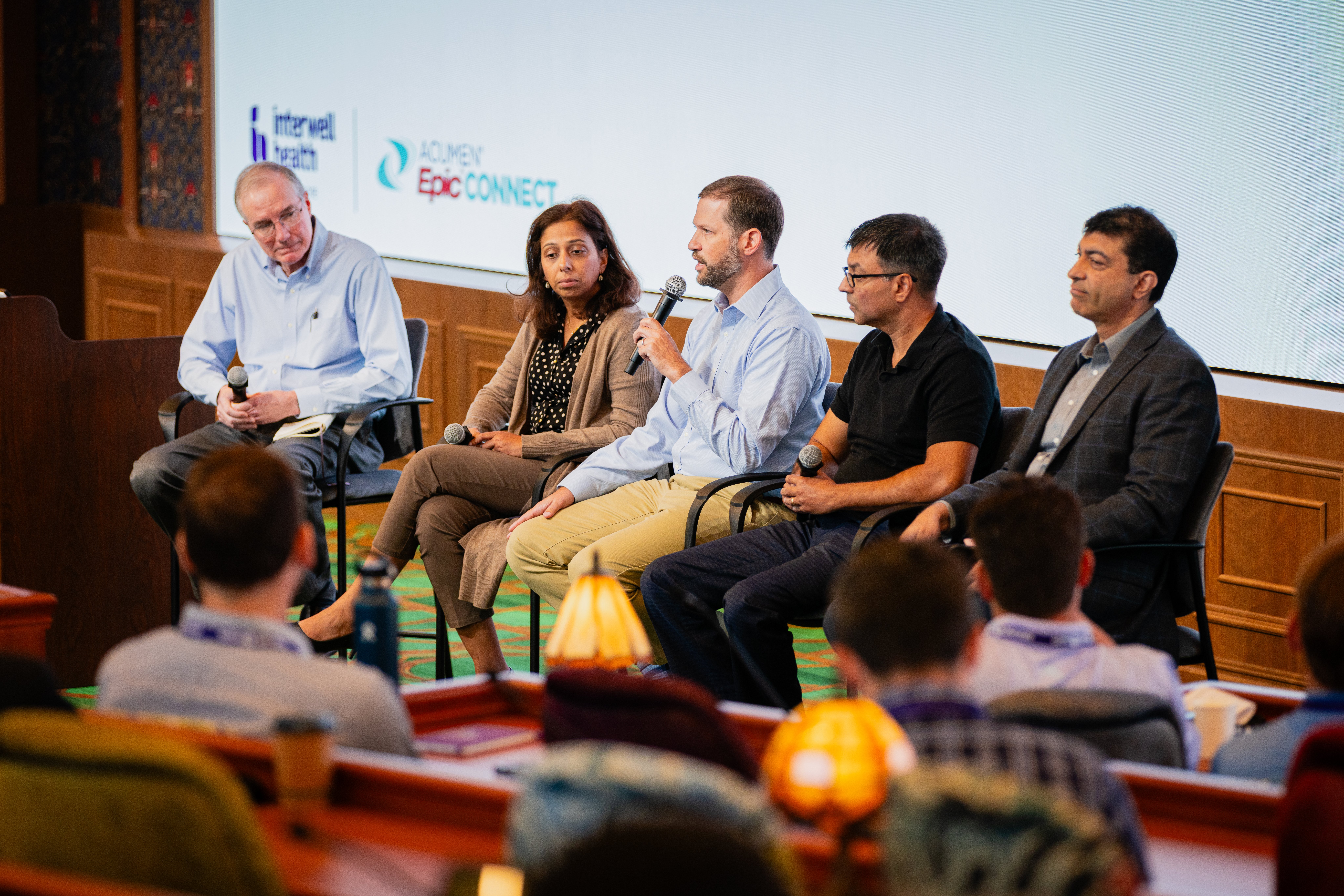Lessons from the Frontlines: Four Nephrologists’ Learnings and Predictions on Value-Based Kidney Care
At the 2024 Acumen Engage User Conference, leading nephrologists joined a panel to share their perspectives on the transition to value-based care and the future of value-based models.
tags

This past September, nephrology providers and practice administrators from around the country gathered for two days in Verona, Wisconsin to network, engage, and learn. Why Verona? The small Wisconsin suburb is known for its scenic charm, proximity to the state’s capital, and attractions including the sprawling Epic Systems campus. It was a fitting location for the Acumen Engage User Conference, where attendees met to discuss the latest advances to Acumen Epic Connect, the most broadly adopted nephrology specific electronic health record (EHR) built on Epic’s leading platform, and how clinicians are using technology and advanced analytics to improve care for people with chronic kidney disease (CKD).
One of the key themes at the conference was the shift to value-based care. On the second day of the event, four leading nephrologists took the stage to share the wins and challenges they have personally encountered on their own value-based care journeys. The panel featured:
- Dr. Kezia Alberto, managing partner of New Jersey-based practice Nephrological Associates
- Dr. Marc Brazie, value-based care lead at Metropolitan Nephrology Associates
- Dr. Amit Mitra, president of Chicago-based Associates in Nephrology (AIN)
- Dr. Manish Tanna, president of Nephrology Associates of Northern Illinois and Indiana (NANI)
During the discussion, the panelists shared why they decided to engage in value-based care programs, their advice for other practices and providers navigating the transition to value-based care, and what they see as the future of the model. Below are highlights from their conversation.
Value-based care aligns financial incentives with clinicians’ goal of doing what’s best for patients

The panel opened with an introduction from moderator Dr. Terry Ketchersid, senior vice president at Interwell Health and medical director of Acumen Physician Solutions. From his more than 30 years of experience in nephrology and medicine, including serving as chief quality officer of a regional health system, Dr. Ketchersid has played a leading role in the shift to value-based kidney care and has witnessed the model’s evolution over the years. Value-based care is about building “a program that rewards providers when outcomes are fantastic,” Dr. Ketchersid told the audience.
Dr. Ketchersid made the case that value-based kidney care has staying power, pointing out that the government has launched multiple value-based programs that are “laser focused” on kidney care. “Think about that. Oncology has one model. Ortho doesn’t really have a model, but the hospitals that do hips and knees have a model. There’s no cardiology model. There’s no pulmonary model…The focus on renal disease is here and it’s here to stay. It’s here because, as you guys know, these are really, really expensive patients.”
For Dr. Brazie, value-based care is more than just a new financial model. “To me, the greatest wins of trying to move into a value-based care world are honestly the fact that it allows you to practice in a way that aligns with what most of our goals are for our patients,” said Dr. Brazie during the panel. He praised value-based care for incentivizing “the right things for patients” and enabling practices to track and improve patients’ health at population scale.

The shift to value-based care requires new tools and resources
The panelists agreed that making the move to value-based care comes with challenges, particularly resource and financial challenges associated with delayed reimbursement and increased demands on providers. Adding to those challenges, Dr. Brazie highlighted that practices need to strike a balance, as they still need to be successful in a fee-for-service world while also adapting their workstreams to succeed in new pay-for-performance models.
Dr. Alberto said Nephrological Associates hired more mid-level clinicians to keep up with frequent follow-ups and boost patient engagement. Currently a relatively small practice with nine physicians, in the year ahead Nephrological Associates is joining with other providers in New Jersey to become one of the largest practices in the state.
As Nephrological Associates grows, Dr. Alberto says one of the best things to happen to the practice was embedding an Interwell renal care coordinator (RCC) into its care team two years ago. “She has helped us bridge the gap in care coordination,” Dr. Alberto shared, noting how having an embedded RCC has helped the practice reach its goals for key quality measures including improving optimal start rates and increasing depression screening.

In addition to care coordination services, Dr. Alberto said the keys to success in value-based care are the ability to identify high-risk patients; robust data and analytics, including the best practice advisories available through Acumen; and provider and patient education, noting that her practice uses Interwell Learning to engage patients at the practice level.
Dr. Brazie agreed, saying DC-based Metropolitan Nephrology Associates also relies on embedded RCCs and has revamped its education platform to use Interwell Learning, which has “helped tremendously with optimal starts.” He also reinforced the importance of data and analytics to identify patients in value-based models, determine their level of risk, and develop their care plan appropriately.
Value-based care is improving patient outcomes, and the next step is driving toward prevention
Echoing Dr. Ketchersid’s prediction that value-based kidney care is here to stay, Dr. Alberto said she sees the continued shift to value-based care as inevitable. Her practice tries to be payer agnostic, as she believes it’s “a matter of time” before more private payers jump in and start offering value-based contracts.
Across the board, the panelists were bullish on value-based care, saying it is already improving patient care and clinical outcomes. For instance, NANI has seen improved outcomes since implementing practice-wide value-based care initiatives such as the use of Interwell Learning. “We saw a significant improvement in our optimal start rate when we focused on education,” said Dr. Tanna. “Transplant has been an area where we’ve really improved by devoting resources,” he added, revealing that NANI nearly doubled its transplants in the government value-based kidney care program from 90 in 2022 to 150 in 2023.

When AIN first made the decision to embrace value-based care, the practice’s physicians all believed in it conceptually, Dr. Mitra told the audience. Putting it into practice, though, was a challenge. Dr. Mitra described how AIN nephrologists met with Interwell to discuss the idea of a value-based care partnership that was about more than telling the practice what to do. From that meeting, the physicians understood that as a partner Interwell would be fully integrated and invested in their long-term success. “All of our physicians got on board right away,” said Dr. Mitra. “Immediately, within one year we saw a 14 percent increase in our CKD population.”
For Dr. Mitra, the transition to value-based care has shaped his belief that the health system needs to do more to take care of people before they end up on dialysis. “Our goal should always be to keep people off dialysis,” he said, stating that the real goal should be preventing progression of kidney disease. He believes the future of value-based care should focus on prevention by expanding to look at measures such as blood pressure management, diabetes management, and use of SGLT2 inhibitors.
Dr. Mitra acknowledged that it would be difficult to measure the effectiveness of preventive practices. “Obviously if a patient is noncompliant and blood pressure medications don’t work, those are issues,” he said. Rather than looking at outcomes alone, he said providers should be able to demonstrate — and document — that they have taken steps to improve care and slow disease progression.
Where should practices new to value-based care get started?
All four panelists are leading the movement to value-based kidney care, and all four have made discoveries along the journey that other practices can learn from. When asked one thing he would change if given the opportunity to start over, Dr. Tanna replied, “We should have been focused even more on [chronic] condition management.” Dr. Tanna’s response reflects the importance of clinical documentation in value-based kidney care, as nephrologists often find themselves managing care for patients not only with CKD but also with compounding, complex health issues such as diabetes and hypertension.
The biggest piece of advice the panel offered for nephrologists just getting started: don’t get caught playing catch up. The panelists voiced that planning is key, and that if they could start over, they would take more time to plan ahead and develop a dedicated strategy for success.
For more insights on how Interwell Health and Acumen Epic Connect are driving improved patient outcomes and population health, read “How Interwell’s Epic EHR Powers Value-Based Outcomes for Payers and Providers.”